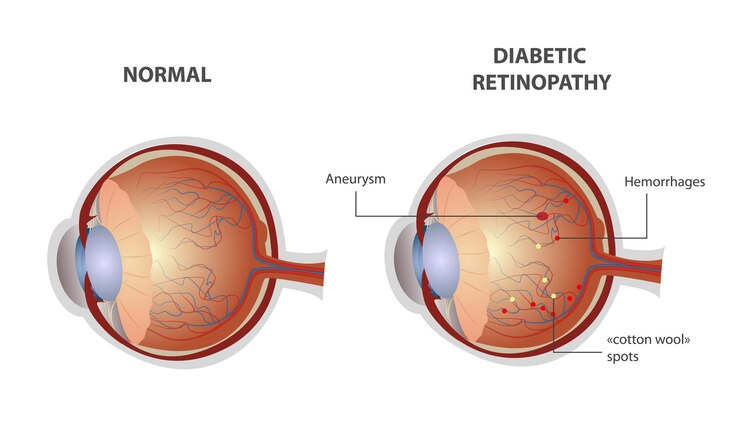Diabetic Retinopathy

Early Detection and Diagnosis
- Dilated Eye Examinations: Our team conducts comprehensive dilated eye examinations to assess the health of the retina and detect early signs of diabetic retinopathy. By examining the blood vessels and structures within the eye, we can identify abnormalities and initiate timely intervention.
- Retinal Imaging: We utilize advanced retinal imaging technology, such as optical coherence tomography (OCT) and fundus photography, to obtain detailed images of the retina and monitor changes over time. These imaging techniques enable us to accurately diagnose diabetic retinopathy and track disease progression.
Personalized Treatment Plans
- Laser Photocoagulation: For patients with proliferative diabetic retinopathy or diabetic macular edema, we offer laser photocoagulation therapy to seal leaking blood vessels and reduce the risk of further vision loss. This targeted treatment helps preserve vision and prevent complications associated with advanced stages of diabetic retinopathy.
- Intravitreal Injections: In cases of diabetic macular edema, we may recommend intravitreal injections of anti-vascular endothelial growth factor (anti-VEGF) medications to reduce swelling and improve vision. These injections target the underlying cause of macular edema and can help restore visual function.
- Surgical Intervention: For severe cases of diabetic retinopathy that do not respond to laser therapy or intravitreal injections, we may recommend vitrectomy surgery to remove scar tissue and blood from the vitreous cavity. This surgical procedure can improve vision and prevent further complications.
Ongoing Monitoring and Management
- Regular Follow-up Visits: We emphasize the importance of regular follow-up visits to monitor the progression of diabetic retinopathy and adjust treatment plans as needed. Our team provides ongoing support and guidance to ensure optimal visual outcomes and eye health.
- Diabetes Management: We collaborate closely with patients’ primary care physicians or endocrinologists to optimize diabetes management and control blood sugar levels. By maintaining tight glycemic control, we can reduce the risk of diabetic retinopathy progression and preserve vision.
- Patient Education: We educate patients about the importance of lifestyle modifications, including maintaining a healthy diet, exercising regularly, and quitting smoking, to reduce the risk of diabetic retinopathy and prevent complications. Through proactive management and adherence to treatment recommendations, patients can protect their vision and enjoy a high quality of life.

